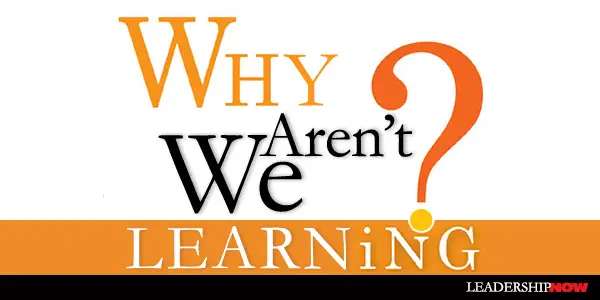 |
 |
09.03.07

Why Aren’t We Learning? JEFFREY PFEFFER observes in What Were They Thinking? that while “learning organization” and “continuous improvement” have become cliché, few companies actually do those things that need to be done to make them smarter. He writes, “That’s because some of the things they need to do to learn are counterintuitive.” And we might add, are frowned upon socially. We would rather say, “We rarely (never) make mistakes,” instead of “We make mistakes, but we’re learning.” The latter just doesn’t have that ring to it. Culturally, mistakes have no glamour to them. To be free of them is everything. We are attracted to the person who seems to be on top of it all. The fact is, we all make mistakes. But are we learning?
JEFFREY PFEFFER observes in What Were They Thinking? that while “learning organization” and “continuous improvement” have become cliché, few companies actually do those things that need to be done to make them smarter. He writes, “That’s because some of the things they need to do to learn are counterintuitive.” And we might add, are frowned upon socially. We would rather say, “We rarely (never) make mistakes,” instead of “We make mistakes, but we’re learning.” The latter just doesn’t have that ring to it. Culturally, mistakes have no glamour to them. To be free of them is everything. We are attracted to the person who seems to be on top of it all. The fact is, we all make mistakes. But are we learning?
It may seem counterintuitive, but the most successful people are making many if not more mistakes than most people. The difference is that they don’t try to cover them up. They acknowledge them, learn from them and move on. At IDEO, they believe that it’s better to make many smaller mistakes than one big one. Pfeffer writes, “But that ethos requires accepting that novelty and innovation are invariably accompanied by setbacks and failures. And embracing such a way of operating requires letting people fail—maybe even encouraging them to fail. After all, if nothing ever goes wrong, it must be because the capabilities of the system and its people have not been truly tested.” This applies on a personal level as well. Are you testing your capabilities? Pfeffer proposes that organizational learning requires three things: 1. A clear understanding of reoccurring problems. “If the root causes of problems are not discovered and remedied, the problems will almost certainly recur . . . . Organizational learning thus requires people to direct others’ attention to problems so they can be noticed, diagnosed, and fundamentally fixed once and for all.” 2. The willingness to allocate resources to address the root causes of those problems. Research on health care organizations “found that those that learned best generally had a higher proportion of managers. . . . They were helping their employees learn, moving information across organizational boundaries, and essentially scanning the environment for common trends and themes, and then bringing that information to their people, who could collectively use it to enhance performance.” 3. Cultural values that foster learning—which means “encouraging employees to find, fix, and report mistakes rather than heroically patch things up.” Fundamental to this issue, is that we—businesses, churches, families, friendships—all too often punish (exclude, at least frown upon) those making mistakes and reward (promote, speak well of, hang-out with) those who don’t seem to be making any. Who would dare try to learn in that environment? Who would ask for help? 
Posted by Michael McKinney at 10:54 AM
|
BUILD YOUR KNOWLEDGE
 

How to Do Your Start-Up Right STRAIGHT TALK FOR START-UPS 
Grow Your Leadership Skills NEW AND UPCOMING LEADERSHIP BOOKS 
Leadership Minute BITE-SIZE CONCEPTS YOU CAN CHEW ON 
Classic Leadership Books BOOKS TO READ BEFORE YOU LEAD |